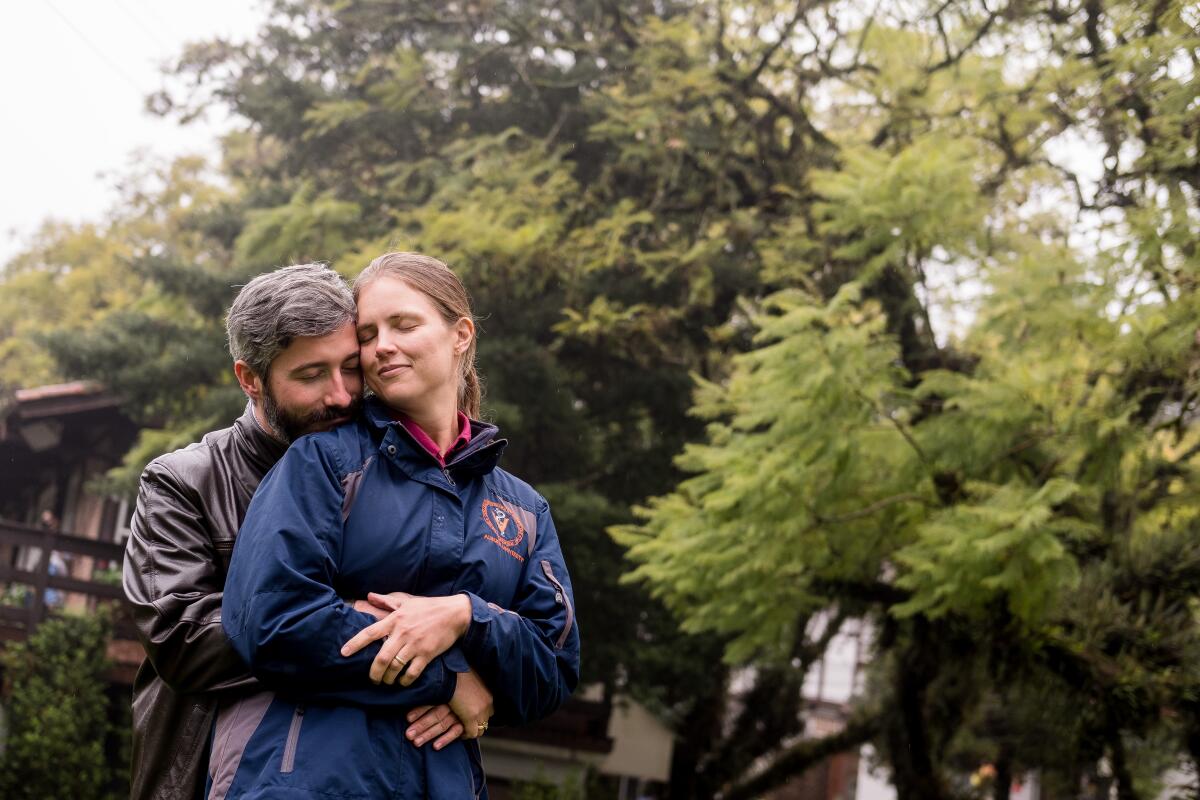In love and in limbo, a Texas rancher was separated from her husband by immigration policy

Kathleen Morriss fires a .22 rifle to rid her garden of âvarmints.â Sheâs a veterinarian with a deep love of animals, particularly the horses and goats she raises on her 5,000-acre ranch in Junction, Texas, a town of 2,574 that voted overwhelmingly to reelect Donald Trump.
The 31-year-old fifth-generation rancher always figured sheâd end up finding her husband in the U.S. But in 2016, she joined an online dating site for Orthodox Christians where she became smitten with Falko König, a 32-year-old agronomist and resident of southern Brazil.
They quickly bonded over their love of cats and spending time outdoors. They instant messaged, Skyped and visited each other across two continents for years.
Even though he was in a different time zone, he made sure to wait up to text her to make sure she got home safely when she worked late nights. On her visits to Brazil, he was the type of guy to open doors for her, and made certain to walk on the street side, between her and vehicles.
When König visited her for the first time in Texas, Morriss showed him the creek, the large pecan trees and the horses on the hardscrabble ranch her mother inherited from her grandparents. He understood that her familyâs land kept Morriss rooted to who she was, her tradition and her family. He was happy to leave his homeland to be with her.
They exchanged vows in February 2019 at an intimate ceremony in Texas, where they planned to settle down.

âI like it that he is willing to live out here and doesnât want to live in a big city,â Morriss said.
But their marriage snared them in the bureaucratic machinery of the U.S. immigration system. When Morriss petitioned for a spousal visa for König in May 2019, the couple thought it would take a little more than a year for his visa to come through and for him to join her in Texas. But 14 months later, in July 2020, König was still waiting in Brazil.
On the surface, it would seem that the couple had every advantage for navigating the immigration labyrinth. Both are educated professionals. She is a U.S. citizen. Heâs a citizen not only of Brazil but also of Germany. They had the means to spend thousands of dollars in application and attorney fees.
Whatâs more, a visa for the spouses of U.S. citizens is among the easiest visas to obtain. There are no caps on how many such visas are given per year as there are on other types of visa sponsorships, for which wait times can be up to 40 years.
Even so, Morriss and König found themselves joining the ranks of hundreds of thousands who have tried to reunite with loved ones only to be stymied by the Trump administrationâs stricter immigration policies and an uncontrolled global pandemic that has shuttered many U.S. embassies and consulates since March.
The closures have left thousands of foreign spouses stuck in their home countries, unable to attend the interviews required for visas to be issued.
In mid-November, the State Department announced that visa services would be resumed at some embassies and consulates, without specifying which ones or when. Even so, spouses likely will face significant visa processing times. Although President-elect Joe Biden has vowed to unravel many of his predecessorâs more restrictive immigration policies, some will be logistically and politically complicated to roll back.
Still, reducing wait times for spousal visas could provide a relatively quick fix for couples like Morriss and König, said Julia Gelatt, a senior policy analyst with the Migration Policy Institute, a Washington D.C.-based think tank.
âIt really just takes a memo,â Gelatt said, to start the process of speeding up the review of applications.
The greater obstacle is that Biden will have a long list of domestic matters to focus on first.
âThis may not be at the top of the priority list,â Gelatt said.
Although Trump was most vocal in his battle against illegal immigration, he quietly waged a war on legal immigration, too, by limiting the options for foreigners to legally migrate to this country for work or to reunite with family.
Many of his efforts bypassed Congress, relying instead on executive actions, changing regulations or modifying policies via memoranda. Some of those memos directed immigration officials to implement higher fees, intensive vetting, and longer forms that made it increasingly difficult to apply and ballooned wait times.
Before Trump took office, processing times for visa applications averaged from less than a month to just shy of two years, depending on the visa, Gelatt said. Under the Trump administration, the length of time it took to process many of these visas doubled â taking up to four years.
The wait times on foreign-spouse visas increased substantially, too.
Over the summer, as Königâs case remained in limbo, Morriss described the application process as a ânightmare.â

âEverything has to be exactly right. If you mess up on one form, there are delays,â she said in July. âFalko has no criminal record; we are legally married. Just let him come in and decide if itâs a fake marriage.â
While separated and waiting, the couple coped by messaging each other several times a day on WhatsApp. Despite the growing pandemic, Morriss flew to Brazil on a few occasions to spend time with König.
They grew even closer during her visits. Morris has a fondness for horses, so whenever the couple walked near a field with horses near his parentsâ house, König would stop and pick grass for the animals so they would come over to greet her.
When it was time to say goodbye, heâd wait with her in the airport until the last minute, right after she entered the security line.
Before Trump became president, spousal-visa processing times were anywhere from nine months to a year. After Trump, processing times increased to as much as 15 months, said Dan Kowalski, an immigration attorney and scholar based in Colorado.
In the pursuit of curbing legal immigration, the Trump administration directed United States Citizenship and Immigration Services to focus on fraud among immigrant and non-immigrant applications.
âThe Trump administration is on this tear over imagined or perceived fraud,â Kowalski said. âThey are convinced that everyone is a liar and a cheater, whether itâs the Ford Motor Co. or a woman in Texas.â
Just a few months after taking office in March 2017, Trump issued a memorandum directing the secretary of State, attorney general and Department of Homeland Security to enhance the screening and vetting of immigration applications.
That meant resources and money were diverted from the processing of applications to focusing on fraud detection and applying high levels of scrutiny to all applications, said Gelatt, the policy analyst.
âThere has been a severe slowdown of processing applications at USCIS,â she said, âand if they are spending more staff time scrutinizing employment-based immigration visas, they leave fewer staff hours for processing spousal visas.â
In addition, Trump increased the amount of paperwork for immigration applications. The application forms became longer and more tedious. For example, the form for a U.S. citizen to sponsor a spouse became nine times as long as it had been. Petitioners also faced more requests for evidence, prolonging the process.
Perhaps most impactfully, the Trump administration revised a âpublic chargeâ rule that essentially tests immigrantsâ wealth before granting them legal status or admitting them to the country.
Under Trump, the rule is interpreted broadly to reduce the number of people who are eligible for green cards and other visas by redefining what makes them dependent on government benefits â or âlikelyâ to become dependent in the future. The 9th U.S. Circuit Court of Appeals partially struck down Trumpâs revision, but the ruling likely will be appealed.
König is a middle-class professional with a well-paying job who just finished his masterâs degree in biotechnology. Still, Morris had to sign paperwork promising to financially support her husband if he couldnât do so, even in the event of divorce.
It took Morrissâ petition more than eight months to clear USCIS and reach the Department of Stateâs National Visa Center, which serves as a go-between for the petitioner and the U.S. Consulate in the visa applicantâs home country, arranging for the applicant to take the visa interview at a consulate abroad.
The center processed the petition in May. But by then, the consulate in Rio De Janeiro had been closed in response to the COVID-19 pandemic.
Despite the closure, the couple held out hope that Königâs case would go forward. But Morriss grew concerned in mid-summer when they still hadnât received word from the consulate about an interview date.
She called and emailed the consulate, where officials said they didnât know when theyâd be able to reopen to help her. She joined Facebook groups with others in similar situations from across the globe. There was a Los Angeles man whose wife was still waiting in Pakistan. An Arizona woman who petitioned for her Nigerian husband in January 2019 but still was separated.
Morriss reached out to her government representatives, who mostly ignored her pleas.
âMy great-great grandfather started our ranch in 1879. Currently my mother runs the ranch and I help her as much as possible. It is very hard work for two people, especially when I also have to work outside the ranch,â Morriss wrote in a July 5 letter to Republican Texas Sen. Ted Cruz. âWe need my husband here to help us take care of our familyâs land and the livestock on it that contribute to the United Statesâ food supply.â
Cruz responded with a form letter, directing her to call the consulate in Rio.
Morriss said she didnât think much about immigration before meeting König.
âIt was abstract. It didnât really affect me much personally. But now, having been through it? I can see how bureaucratic, expensive and difficult it is.â
Morriss, a Trump supporter who describes herself as a libertarian, says she doesnât blame the outgoing president for her situation but does take issue with an immigration system that she believes needs to undergo âmassive reform.â She blames both Democrats and Republicans for constructing an âover-regulatedâ bureaucracy.
âA lot of hard-working people want to come, but itâs just impossible,â Morriss said. âWhy not simplify the process? Then people wouldnât have to do it illegally and not cost them a fortune.â
Morriss, who lives about a two-hour drive from the U.S.-Mexico border, says she doesnât condone illegal immigration.
âBut I completely understand why people do it,â she said. âNobody wants to wait 10 years. I mean, who is going to wait 30 years? Itâs insane.â
She doesnât expect Biden to improve the situation much.
âI doubt thatâs going to be the top thing on his list, to get some spouses of U.S. citizens in the country,â she said.
When the couple realized they might have hit a dead end with the consulate in Brazil, they decided to switch their case to the U.S. Consulate in Frankfurt, Germany, because of Königâs German ancestry. The U.S. Consulate in Frankfurt ended up accepting Morrissâ petition and granted König an interview in late September.
On Nov. 18, he finally arrived in Texas just in time to celebrate his first Thanksgiving with Morriss.
Most of the coupleâs days are spent running errands to complete his transformation as an American, such as applying for his driverâs license, procuring a license to carry a firearm, and purchasing an ugly Christmas sweater at their local Walmart.
The rest of their time is spent on the ranch. König has yet to receive his physical green card. It likely wonât arrive for several months because of a delay.
More to Read
Sign up for Essential California
The most important California stories and recommendations in your inbox every morning.
You may occasionally receive promotional content from the Los Angeles Times.
![[20060326 (LA/A20) -- STATING THE CASE: Marchers organized by unions, religious organizations and immigrants rights groups carry signs and chant in downtown L.A. "People are really upset that all the work they do, everything that they give to this nation, is ignored," said Angelica Salas of the Coalition of Humane Immigrant Rights. -- PHOTOGRAPHER: Photographs by Gina Ferazzi The Los Angeles Times] *** [Ferazzi, Gina -- - 109170.ME.0325.rights.12.GMF- Gina Ferazzi/Los Angeles Times - Thousands of protesters march to city hall in downtown Los Angeles Saturday, March 25, 2006. They are protesting against House-passed HR 4437, an anti-immigration bill that opponents say will criminalize millions of immigrant families and anyone who comes into contact with them.]](https://ca-times.brightspotcdn.com/dims4/default/d699c9b/2147483647/strip/true/crop/1977x1322+112+0/resize/320x214!/quality/75/?url=https%3A%2F%2Fcalifornia-times-brightspot.s3.amazonaws.com%2Fzbk%2Fdamlat_images%2FLA%2FLA_PHOTO_ARCHIVE%2FSDOCS%2854%29%2Fkx3lslnc.JPG)










